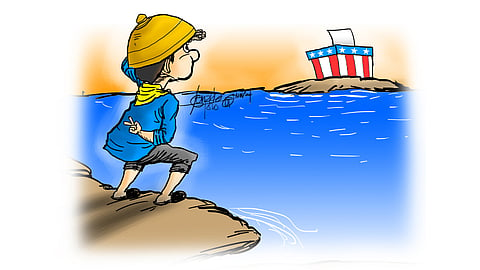
- NEWS
- the EDIT
- COMMENTARY
- BUSINESS
- LIFE
- SHOW
- ACTION
- GLOBAL GOALS
- SNAPS
- DYARYO TIRADA
- MORE

As Americans troop to the polls Tuesday to elect a new United States president, fears had been raised over its global implications and how it will invariably affect the Philippines, an important ally and partner in the Indo-Pacific region.
Policy directions under a new or returning US administration could reshape aspects of Philippine foreign policy, economic partnerships, security concerns and development initiatives.
The Philippines, with its strategic geographic position, shared history with the US, and involvement in regional affairs, closely watches these political shifts, especially amid rising tensions with China and domestic economic challenges.
One primary area of impact is security cooperation. The US-Philippines alliance, grounded in mutual defense treaties, could experience renewed or redefined focus. In recent years, the geopolitical climate, particularly in the South China Sea, has heightened the Philippines’ need for security support.
A US administration inclined toward a robust anti-China stance would likely enhance support for the Philippines through increased military aid, joint exercises and possibly expanded basing arrangements. This posture could deter China’s assertiveness in the South China Sea, bolstering the Philippines’ security.
However, if the new administration prioritizes a diplomatic approach with China, there may be less direct US intervention in these territorial disputes, which might press the Philippines to reassess its defense strategies and even pursue alliances with other regional partners like Japan, Australia and India.
The Philippines and the US have deep-rooted economic ties, with millions of dollars in trade and investment flowing between the two nations. The US is among the largest foreign investors in the Philippines and a significant market for Filipino goods.
However, the future direction of US trade policies, especially if they lean toward protectionism or prioritize American economic interests above international trade alliances, could impact Filipino businesses and exports.
If a new administration embraces free trade and multilateral economic engagement, the Philippines might benefit from more favorable trade terms, increased investments and expanded market access.
Such a scenario could support Filipino export-driven industries, like electronics and business process outsourcing (BPO), which rely on American clientele. On the other hand, stricter US immigration and outsourcing policies could negatively impact the BPO industry and Filipino workers abroad if the administration seeks to reduce dependency on foreign labor.
The United States is home to a substantial population of Filipino immigrants and overseas workers. Policies related to immigration and worker rights are thus crucial issues. Many OFWs and immigrants contribute to the Philippine economy through remittances, which support families and local businesses.
Changes in US immigration laws, visa policies, or labor protections could affect the income flow from this sector, impacting countless households in the Philippines.
Human rights are an increasingly critical aspect of US foreign policy, especially regarding allies in the developing world. American presidents have, in the past, leveraged their influence to encourage adherence to democratic values, freedom of speech and civil rights.
A US president focused on human rights and the rule of law may more openly critique the Philippines on sensitive issues, such as the government’s approach to drugs, press freedom, and judicial independence.
Such scrutiny could strain US-Philippines relations, as seen in previous administrations when critical stances on human rights issues led to friction with Philippine leaders. However, a US administration that avoids interfering in other countries’ domestic affairs might prioritize economic and military cooperation over human rights issues, resulting in warmer diplomatic ties but potentially affecting the international human rights discourse.
Climate change is a growing concern for the Philippines, one of the most climate-vulnerable countries. US policies on climate change could shape the Philippines’ approach to environmental issues and disaster resilience. If a US administration prioritizes global environmental cooperation, the Philippines might benefit from increased climate-related aid, technology transfers and disaster resilience support.
The outcome of the US presidential election will reverberate across the Philippines’ political, economic and social spheres. Whether it involves increased security support, robust trade partnerships, or advancements in climate resilience, these changes will impact the country’s development trajectory.
As the Philippines navigates its place in the region amid growing global competition, a stable, beneficial partnership with the US remains vital, underscoring the importance of this election’s implications on Philippine policy and strategy in the years to come.
